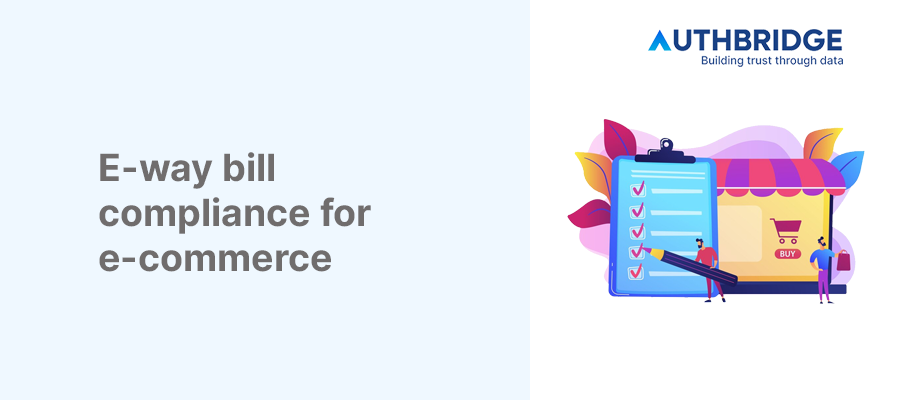E-Way Bill Compliance For E-Commerce: Essential Guide For Smooth Operations

The rise of e-commerce in India has revolutionized the way consumers shop, creating a dynamic and rapidly growing market. However, navigating the complexities of the Goods and Services Tax (GST) regime is crucial for e-commerce businesses to ensure smooth operations and avoid compliance issues. This blog post specifically focuses on E-way bill compliance for e-commerce, providing insights and practical information drawn from official verified sources like the Indian government website and Central Board of Indirect Taxes and Customs (CBIC) documents.
Understanding E-way Bills:
In India, the E-way bill system is a mandatory electronic document required for the movement of goods exceeding ₹50,000 in value within the country. It aims to:
- Enhance transparency: By providing a digital record of goods movement, E-way bills facilitate tax administration and help prevent tax evasion practices.
- Streamline logistics: Real-time tracking of goods ensures smooth movement and reduces delays at checkpoints.
- Minimize manual processes: The system promotes automation and minimizes reliance on paper-based documentation.
E-way Bill Applicability for E-commerce:
E-way bill requirements apply to all e-commerce businesses involved in the movement of goods, including:
- Marketplaces: Platforms acting as facilitators between sellers and buyers must comply with E-way bill regulations when goods exceed the value threshold.
- Sellers: Individual sellers fulfilling orders directly to customers are responsible for generating E-way bills if the value of the goods surpasses ₹50,000.
- Fulfillment centers: These logistics providers storing and shipping goods on behalf of e-commerce businesses must ensure E-way bills are generated for shipments exceeding the value limit.
Key Considerations for E-commerce Businesses:
- Determining E-way Bill Responsibility: E-way bill generation responsibility lies with:
- The supplier: If the e-commerce platform facilitates the sale but acts only as a facilitator without taking ownership of the goods.
- The e-commerce platform: If the platform acts as a marketplace but takes ownership of the goods during the transaction process.
- The seller: When individual sellers directly fulfill orders and ship goods to customers.
- E-way Bill Generation Process:
- Registration: E-commerce businesses must register on the GST portal (https://www.gst.gov.in/).
- Data Preparation: Ensure accurate information about the goods, including description, HSN code, quantity, value, and recipient details.
- E-way Bill Generation: Utilize the E-way bill portal (https://ewaybillgst.gov.in/) to generate E-way bills for each eligible shipment.
- Transporter Details: Update Part B of the E-way bill with transporter information once the goods are shipped.
- Integration with E-commerce Platforms:
- Several e-commerce platforms offer integration with the E-way bill portal. This allows businesses to automatically generate E-way bills based on order data, eliminating manual data entry and minimizing errors.
- API (Application Programming Interface) integration also allows seamless data transfer between the e-commerce platform and the E-way bill portal, further streamlining E-way bill generation.
- Data Accuracy and Record Keeping:
- Maintaining accurate data throughout the order fulfillment process is crucial for generating accurate E-way bills.
- Preserving records of E-way bills, invoices, and delivery challans for at least two years is mandatory for potential audits by tax authorities.
Data and Statistics:
- According to a report by Statista, the Indian e-commerce market is expected to reach a value of USD 350 billion by 2030, reflecting its significant growth trajectory.
- As of December 2023, the e-way bill portal statistics show over 14.5 billion E-way bills generated, highlighting the system's widespread adoption across various industries, including e-commerce.
Challenges and Solutions:
E-commerce businesses may encounter specific challenges related to E-way bill compliance:
- Order Cancellations and Returns: Businesses need efficient processes to cancel or update E-way bills in case of order cancellations or returns, ensuring they are compliant with the 24-hour cancellation window and revised information for returned goods.
- Multiple Logistics Providers: When working with various logistics companies, ensuring each provider updates their part of the E-way bill with accurate vehicle details is crucial.
- Inventory Management: Maintaining accurate and updated inventory records is essential for accurate E-way bill generation, reflecting the actual quantity of goods being shipped.
Solutions:
- Implementing robust order management systems can help track orders, cancellations, and returns, allowing for timely E-way bill updates.
- Establishing clear communication channels with all logistics partners ensures they understand their responsibilities regarding E-way bill updates.
- Utilizing inventory management software can streamline inventory control and ensure accurate data for E-way bill generation.
Best Practices for E-commerce Businesses:
- Invest in training: Educate employees involved in the order fulfillment process on E-way bill procedures to ensure accurate generation and compliance.
- Automate processes: Leverage technology for E-way bill generation through integration with the e-commerce platform or utilizing APIs.
- Seek professional guidance: Consult with a tax professional for specific advice and guidance on E-way bill compliance based on your business model and operations.
- Stay updated: Regularly monitor the CBIC website and official notifications for any changes in E-way bill rules and regulations.
Conclusion:
E-way bill compliance is a crucial aspect of operating an e-commerce business in India. By understanding the regulations, applying best practices, and leveraging technology solutions, e-commerce businesses can ensure smooth operations, maintain compliance with GST regulations, and contribute to a more efficient and transparent supply chain ecosystem. This blog post has provided insights and practical guidance to assist e-commerce businesses in navigating E-way bill requirements and overcoming potential challenges. Remember, staying informed and actively managing E-way bills is essential for success in the dynamic landscape of e-commerce within the Indian GST regime.
Category

Abhinandan Banerjee
(Associate Manager - Marketing)
Abhinandan is a dynamic Product and Content Marketer, boasting over seven years of experience in crafting impactful marketing strategies across diverse environments. Known for his strategic insights, he propels digital growth and boosts brand visibility by transforming complex ideas into compelling content that inspires action.



